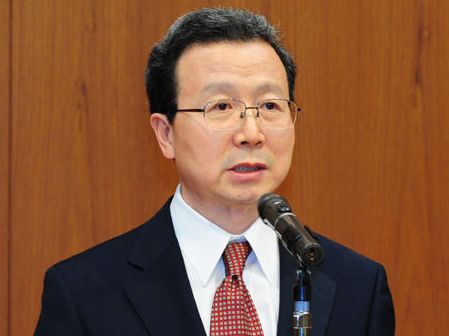Japan ups stakes in islands dispute
 0 Comment(s)
0 Comment(s) Print
Print E-mail China Daily, February 6, 2013
E-mail China Daily, February 6, 2013
Japan on Tuesday intensified the ongoing territorial dispute with China by setting up a new publicity office aimed at Diaoyu Islands-related propaganda issues.
Observers warned that the move will undermine recent efforts made by the two countries to improve ties.
 |
|
Chinese Ambassador to Japan Cheng Yonghua [File photo] |
On Tuesday, Chinese Ambassador to Japan Cheng Yonghua also rejected Tokyo's protest over Chinese marine surveillance vessels patrolling waters off the islands, the Chinese embassy in Japan said.
Cheng stressed that the Diaoyu Islands are China's inherent territory and so are the surrounding waters, and Chinese marine surveillance vessels are conducting regular patrols in Chinese territorial waters.
The ambassador made the remarks in a meeting with Japanese Vice-Minister of Foreign Affairs Akitaka Saiki.
Two Chinese marine surveillance ships continued patrols in territorial waters surrounding the Diaoyu Islands on Monday, according to China's State Oceanic Administration, Xinhua News Agency reported. Chinese Foreign Ministry spokeswoman Hua Chunying on Tuesday urged Japan to stop the illegal entry of ships in waters off the islands and to stop sending jets into air space over them.
Japan should face up to history and show more sincerity with practical actions to cooperate with China in finding ways to control and resolve the dispute, she said.
Tokyo on Tuesday said it was setting up an office to publicize Japan's stance on territorial disputes, including the Diaoyu Islands row with China, and other disputes over islands with Russia and South Korea.
The office, which will have 15 employees, will coordinate within the government and draw up publicity strategies on territorial issues, according to Japanese media.
At present, the Japanese Cabinet Secretariat, the Cabinet Office and the Foreign Ministry all have teams dealing with propaganda for Tokyo's territorial claims.
Lu Yaodong, a researcher on Japanese studies with the Chinese Academy of Social Sciences, said establishing the office shows conservative power still dominates in Japanese political circles.
Liang Yunxiang, a professor of Japanese studies at Peking University, said the new office will affect Sino-Japanese ties and further provoke China.
Tokyo sent a series of officials to China last month to mend ties dented following the Japanese government's illegal "purchase" of some parts of the Diaoyu Islands in September. They included former Japanese prime minister Yukio Hatoyama, and Natsuo Yamaguchi, leader of the New Komeito Party, the junior coalition partner.






Go to Forum >>0 Comment(s)